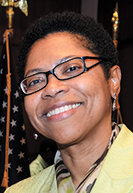Subscriber Benefit
As a subscriber you can listen to articles at work, in the car, or while you work out. Subscribe Now
Environmental attorney Kathryn Watson was already scheduled to be a guest speaker in the clean air law class during Indiana University Robert H. McKinney School of Law’s spring semester when the professor called to ask if she would be willing to shoulder a bit more responsibility.
Watson has been a longtime friend and is a former colleague of Janet McCabe, environmental law professor IU McKinney. The pair first worked together at the Indiana Department of Environmental Management in the late 1990s. Since then, the Katz Korin Cunningham attorney has occasionally visited McCabe’s classes to talk to the students.
However, Watson leaped from guest to adjunct faculty when McCabe was tapped by President Joe Biden in mid-January to serve as deputy administrator of the U.S. Environmental Protection Agency. Watson is well-versed in the federal Clean Air Act, but she has been energized by digging into some areas of the law where she had gotten “kind of rusty” and by seeing the statute from the students’ perspective.
“Sometimes the knowledge we have we take for granted until we start explaining it to somebody else,” Watson said. “Then you realize what you know, but you also realize what you don’t know and what more there is to explore.”
IU McKinney, like other law schools across the country, has a roster of legal professionals who bring their expertise into the classrooms as well as the clinics. The Indianapolis address gives an advantage by enabling the institution to recruit from a deep pool. Justices, judges, attorneys working in the private and public sectors, general counsel and even professors from other schools within the university are on IU McKinney’s list of adjunct faculty.

As IU McKinney Dean Karen Bravo explained, the members of the practicing bar can bring an expertise that allows the school to offer a class in a very niche area of the law. Also, the students benefit by learning the law from attorneys who have real-world experiences and who can help with networking.
Lawyers wanting to be an adjunct have to be experts in their fields and must be approved by a faculty committee.
“The faculty committee looks at the credentials of each prospective adjunct,” Bravo said, “…because the faculty has a responsibility as does the administration to make sure the quality of the education is good.”
McCabe brought a lot of real-world experience to her classroom. She served as assistant commissioner of IDEM and then led the nonprofit Improving Kids’ Environment before joining the EPA, where she worked for nearly 10 years, including a stint as acting assistant administrator of the Office of Air and Radiation. While teaching at IU McKinney, she also served as the director of the IU Environmental Resilience Institute.
While her nomination and confirmation process is ongoing, McCabe still teaches the class when she is able. When they do co-teach, Watson said the students are able to get an understanding of the clean air law from different viewpoints. She talks of applying the act as a practicing attorney while McCabe explains the law from the standpoint of public policy and regulation.
Watson, a graduate of Indiana University Maurer School of Law, had some experience teaching prior to becoming an adjunct. She has given presentations at conferences and to law students as well as mentored associates. At IU McKinney, where she said her students tend to be “really smart” and “very enthusiastic,” she has been able to continue teaching the next generation of lawyers, which she maintains is a duty of practicing attorneys.
“You have an obligation at some point in your career to be interacting with the people who are going to take your place, essentially, and sharing your knowledge with them,” Watson said, noting that not every lawyer has the “great opportunity” to serve as an adjunct faculty. “I feel very lucky.”
Bravo described McCabe as the “consummate professional” because she is working to make a smooth exit. Typically, departing faculty members provide plenty of notice and leave at the end of the spring semester, giving the law school time to recruit and bring in new blood.
McCabe did not have that luxury. Instead, she alerted IU McKinney about a week in advance of the announcement of her nomination and suggested Watson as her backup. She provided Watson with the syllabus and all the class materials and engaged with the students when possible.
As of IL deadline, McCabe’s nomination had been approved and was awaiting a full vote by the Senate.
“For now, I think, we will say goodbye to Janet because I hope that she will have a very fruitful and wonderful experience at the EPA,” Bravo said. “If and when she decides to return to Indiana, we definitely would be interested, of course, in renewing our connection to her.”•
Please enable JavaScript to view this content.
